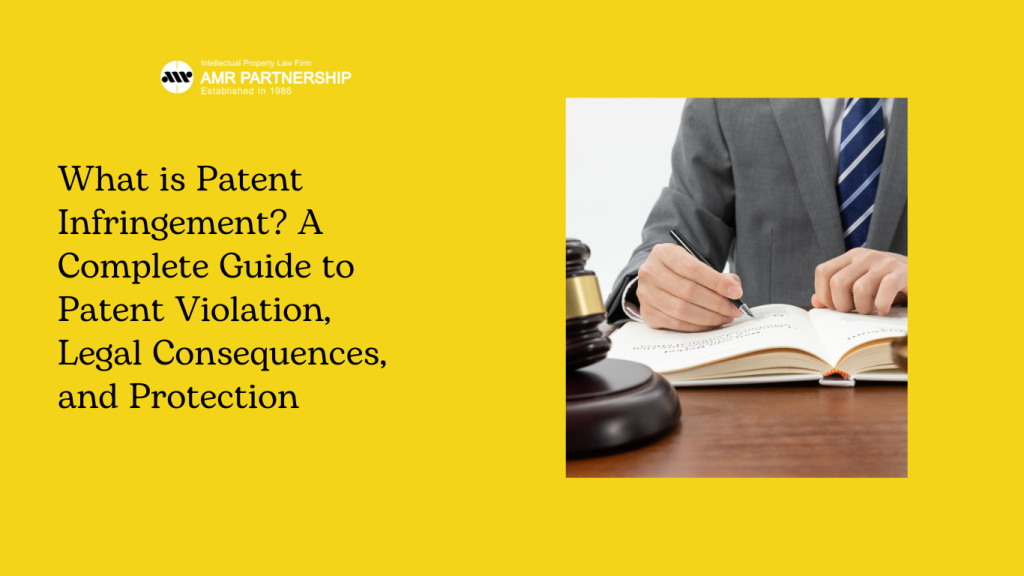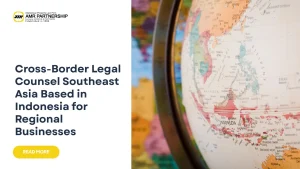
Patent infringement is a growing concern in today’s innovation-driven world. As industries evolve and intellectual property becomes a vital business asset, understanding what is patent infringement is essential for innovators, entrepreneurs, and legal professionals alike. At AMR Partnership, our experienced legal team provides trusted guidance and legal solutions to help businesses defend their patented inventions in Indonesia.
What is Patent Infringement?
A patent is a legal right granted to inventors, giving them exclusive rights to produce, use, sell, or distribute their invention for a specific period. According to the World Intellectual Property Organization (WIPO), patents are essential in promoting innovation by granting creators the ability to commercialize their inventions securely.
Patent infringement occurs when a third party uses, makes, sells, or imports a patented product or process without the consent of the patent holder. This unauthorized use violates the patent holder’s exclusive rights and can lead to legal action under patent law.
In Indonesia, patent protection is regulated under Law No. 13 of 2016 on Patents, which clearly outlines what constitutes infringement and the corresponding legal remedies available to the patent owner.
Understanding this concept is crucial not only for large corporations but also for SMEs, researchers, and product developers. As the innovation landscape becomes more competitive, failing to protect patents or violating others’ rights can result in substantial legal and financial consequences.
READ MORE: Who Governs Intellectual Property Rights in Indonesia? Key Authorities, Regulations, and Their Roles
Types of Patent Infringement
Patent infringement can take various forms. Recognizing these types can help patent holders better identify potential violations and take appropriate legal action.
Direct Infringement
This is the most straightforward form of infringement. It occurs when an entity manufactures or sells a patented invention without the owner’s permission. For example, copying a patented product design or process and offering it in the market constitutes direct infringement.
Indirect Infringement
Indirect infringement occurs when someone encourages or assists another party in infringing a patent, even if they do not commit the act directly. This may include supplying components that are specifically made for use in a patented invention.
Willful Infringement
This type of infringement happens when a party knowingly and intentionally violates a patent. Willful infringement is considered more severe and often results in higher damages.
Literal Infringement vs Doctrine of Equivalents
Literal infringement happens when each element of a claim in the patent is found exactly in the infringing product or process. Under the doctrine of equivalents, infringement may still occur if the accused product performs substantially the same function in a similar way to achieve the same result, even if it does not match the patent’s claims word-for-word.
At AMR Partnership, our legal experts are well-versed in analyzing both literal and equivalent patent claims to advise clients effectively.
READ MORE: When Was Intellectual Property Law Enacted in Indonesia? History and Development
Examples of Patent Infringement
Real-world cases help to illustrate the seriousness of patent infringement and the need for legal protection.
In the pharmaceutical sector, for instance, unauthorized manufacturing of patented chemical compositions can lead to massive lawsuits and penalties. Although we avoid referring to external brand cases, many domestic and global disputes have revolved around patent rights.
In Indonesia, AMR Partnership has assisted multiple clients in detecting and responding to infringement involving patented machinery, agricultural equipment, and chemical processes. By taking preemptive legal steps, many businesses have successfully blocked the production and distribution of infringing goods.
These examples underscore the importance of having experienced IP counsel, such as AMR, who understand the nuances of patent law and enforcement strategies in the Indonesian legal context.
READ MORE: How Does Copyright Work? A Step-by-Step Guide for Content Creators
Legal Consequences of Patent Infringement
Patent holders whose rights are violated can pursue various legal remedies under Indonesian law.
Civil Remedies
Patent owners can file a civil lawsuit against the infringer, seeking:
- Compensation for damages
- Injunctions to stop further use or production
- Seizure or destruction of infringing goods
AMR Partnership assists clients throughout this process, from filing to enforcement.
Criminal Sanctions
In certain cases, patent infringement may also lead to criminal charges, especially if the infringement results in significant economic harm. According to Law No. 13 of 2016, criminal penalties may include:
- Imprisonment
- Fines
- Confiscation of assets
Alternative Dispute Resolution (ADR)
Clients may also opt for alternative methods such as mediation or arbitration to settle patent disputes more efficiently. AMR’s experienced legal team offers both litigation and ADR services to protect client interests based on the case specifics.
READ MORE: How Long Is Intellectual Property Valid For? Duration of Copyright, Patents, and Trademarks
How to Avoid Patent Infringement
Avoiding patent infringement requires careful due diligence and legal consultation.
Freedom-to-Operate (FTO) Search
Before launching a new product, companies should perform FTO searches to ensure no existing patents are being violated. This involves analyzing existing patents in the jurisdiction where the product will be marketed.
Consult with Intellectual Property Experts
Legal advisors, such as the team at AMR Partnership, can review products and processes to ensure they do not infringe on existing patents.
Register Your Own Patents
By registering patents proactively, companies not only protect their innovations but also create a legal basis to defend them. Our firm provides comprehensive patent registration services both domestically and internationally.
Implement IP Awareness in R&D
Ensure research and development teams are trained on IP laws to avoid unintentional infringement and foster a culture of compliance.
READ MORE: What Content Is Not Protected by Copyright? Know the Limits of IP Law
How to Report Patent Infringement
Patent holders who suspect their rights are being violated must act swiftly to protect their IP.
Documentation Preparation
Gather clear documentation proving ownership of the patent and evidence of the infringement. This can include patent certificates, product samples, distribution records, and public advertisements.
Reporting Process
In Indonesia, a complaint can be filed to the Directorate General of Intellectual Property (DJKI) or directly to the courts. AMR Partnership assists clients in preparing the required documentation and guiding them through the litigation or mediation process.
Monitoring and Enforcement
With AMR’s assistance, many clients use market monitoring and cooperation with customs authorities to identify and stop infringing goods at borders, especially in the case of imports.
READ MORE: What Are the Penalties for Copyright Infringement in Indonesia?
Patent Infringement in Indonesia: Challenges and Progress
Patent enforcement in Indonesia has evolved significantly, but challenges remain.
Enforcement Challenges
- Lack of awareness among local businesses
- Delays in court processes
- Limited resources for border enforcement
Progress and Government Initiatives
The Indonesian government has made strides in improving IP protection:
- DJKI e-filing systems simplify patent registration and monitoring
- Cooperation with Customs and Excise authorities to intercept infringing goods
- Public education programs to raise awareness about patent rights
AMR Partnership continues to work alongside government initiatives to help enforce client rights and participate in regulatory discussions to improve IP frameworks.
Frequently Asked Questions (FAQ)
What is considered patent infringement?
Patent infringement involves the unauthorized use, sale, manufacturing, or distribution of a patented invention without the permission of the patent holder.
What are the penalties for patent infringement in Indonesia?
Penalties may include civil damages, injunctions, and in some cases, criminal sanctions such as imprisonment and fines, as stipulated in Indonesian Patent Law.
How can I protect my patent?
By registering your invention through the DJKI or via AMR Partnership’s legal team, and actively monitoring the market for potential infringement.
What should I do if someone infringes my patent?
Consult with AMR immediately to evaluate your legal position, gather evidence, and file a complaint either to DJKI or through the court system.
Can patent infringement be resolved without going to court?
Yes, alternative dispute resolution methods such as mediation and arbitration are available and often recommended to save time and cost.
How long does a patent last in Indonesia?
A standard patent in Indonesia is valid for 20 years from the filing date, while a simple patent (utility model) is valid for 10 years.
- Phone (Hunting): +62-21-29036668
- Fax: +62-21-29036672 to 75
- WhatsApp Customer Service: Click here to chat
- Instagram: @amrpartnership
- TikTok: @amr.partnership
- Facebook: Law Firm AMR Partnership
- Official Website: www.amr.co.id






